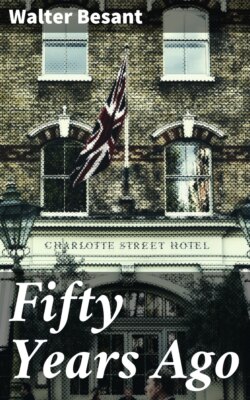Fifty Years Ago

Реклама. ООО «ЛитРес», ИНН: 7719571260.
Оглавление
Walter Besant. Fifty Years Ago
Fifty Years Ago
Table of Contents
FIFTY YEARS AGO
CHAPTER I. GREAT BRITAIN, IRELAND, AND THE COLONIES
CHAPTER II. THE YEAR 1837
CHAPTER III. LONDON IN 1837
CHAPTER IV. IN THE STREET
CHAPTER V. WITH THE PEOPLE
CHAPTER VI. WITH THE MIDDLE-CLASS
CHAPTER VII. IN SOCIETY
CHAPTER VIII. AT THE PLAY AND THE SHOW
CHAPTER IX. IN THE HOUSE
CHAPTER X. AT SCHOOL AND UNIVERSITY
CHAPTER XI. THE TAVERN
CHAPTER XII. IN CLUB- AND CARD-LAND
CHAPTER XIII. WITH THE WITS
CHAPTER XIV. JOURNALS AND JOURNALISTS
CHAPTER XV. THE SPORTSMAN
CHAPTER XVI. IN FACTORY AND MINE
CHAPTER XVII. WITH THE MEN OF SCIENCE
CHAPTER XVIII. LAW AND JUSTICE
CHAPTER XIX. CONCLUSION
VALUABLE AND INTERESTING WORKS. FOR. PUBLIC & PRIVATE LIBRARIES,
Отрывок из книги
Walter Besant
Published by Good Press, 2019
.....
As soon as the battle of Waterloo was fairly fought and Napoleon put away at St. Helena, the Continental professors, historians, political students, and journalists all began with one accord to prophesy the approaching downfall of Great Britain, which some affected to deplore and others regarded with complacency. Everything conspired, it was evident, not only to bring about this decline, but also to accelerate it. The parallel of Carthage—England has always been set up as the second Carthage—was freely exhibited, especially in those countries which felt themselves called upon and qualified to play the part of Rome. It was pointed out that there was the dreadful deadweight of Ireland, with its incurable poverty and discontent; the approaching decay of trade, which could be only, in the opinion of these keen-sighted philosophers, a matter of a few years; the enormous weight of the National Debt; the ruined manufacturers; the wasteful expenditure of the Government in every branch; the corrupting influence of the Poor Laws; the stain of slavery; the restrictions of commerce; the intolerance of the Church; the narrowness and prejudice of the Universities; the ignorance of the people; their drinking habits; the vastness of the Empire. These causes, together with discontent, chartism, republicanism, atheism—in fact, all the disagreeablisms—left no doubt whatever that England was doomed. Foreigners, in fact, not yet recovered from the extraordinary spectacle of Great Britain’s long duel with France and its successful termination, prophesied what they partly hoped out of envy and jealousy, and partly feared from self-interest. Therefore the politicians and professors were always looking at this country, writing about it, watching it, visiting it. No; there could be no doubt; none of these changes and dangers could be denied; the factories were choked with excessive production; poverty stalked through the country; the towns were filled with ruined women; the streets were cumbered with drunken men; the children were growing up in ignorance and neglect inconceivable; what could come of all this but ruin? Even—and this was the most wonderful and incredible thing to those who do not understand how long a Briton will go on enduring wrongs and suffering anomalies—the very House of Commons in this boasted land of freedom did not represent half the people, seats were openly bought and sold, others were filled with nominees of the great men who owned them. What could possibly follow but ruin—swift and hopeless ruin? What, indeed? Prophets of disaster always omit one or two important elements in their calculations, and it is through these gaps that the people basely wriggle, instead of fulfilling prophecy as they ought to do. For instance, there is the recuperative power of Man, and there is his individuality. He may be full of moral disease, yet such is his excellent constitution that he presently recovers—he shakes off his evil habits as he shakes the snow off his shoulders, and goes on an altered creature. Again, the mass of men may be in heavy case, but the individual man is patient; he has strength to suffer and endure until he can pull through the worst; he has patience to wait for better times; difficulties only call forth his ingenuity and his resource: disaster stiffens his back, danger finds him brave. Always, to the prophet who knows not Man, the case is hopeless. Always, to one who considers that by gazing into the looking-glass, especially immediately before or after his morning bath, he may perceive his brother as well as himself, things are hopeful. My brother, have things, at your worst, ever been, morally, so bad with you that you have despaired of recovery, seeing that you had only to resolve and you were cured? Have you ever reflected that while, to the outside world, to your maiden aunts and to your female cousins, you were most certainly drifting to moral wreck and material ruin, you have gone about the world with a hopeful heart, feeling that the future was in your own grasp? Even now the outlook of the whole world is truly dark, and the clouds are lowering. Yet surely the outlook was darker, the clouds were blacker, fifty years ago. Read Carlyle’s ‘Past and Present,’ and compare. There may be other dangers before us of which we then suspected nothing. But if we still preserve the qualities which enabled us to stand up, almost alone, against the colossal force of Napoleon, with Europe at his back, and which carried us through the terrible troubles which followed the war, we surely need not despair.
THE DUCHESS OF KENT, WITH THE PRINCESS VICTORIA AT THE AGE OF TWO
.....